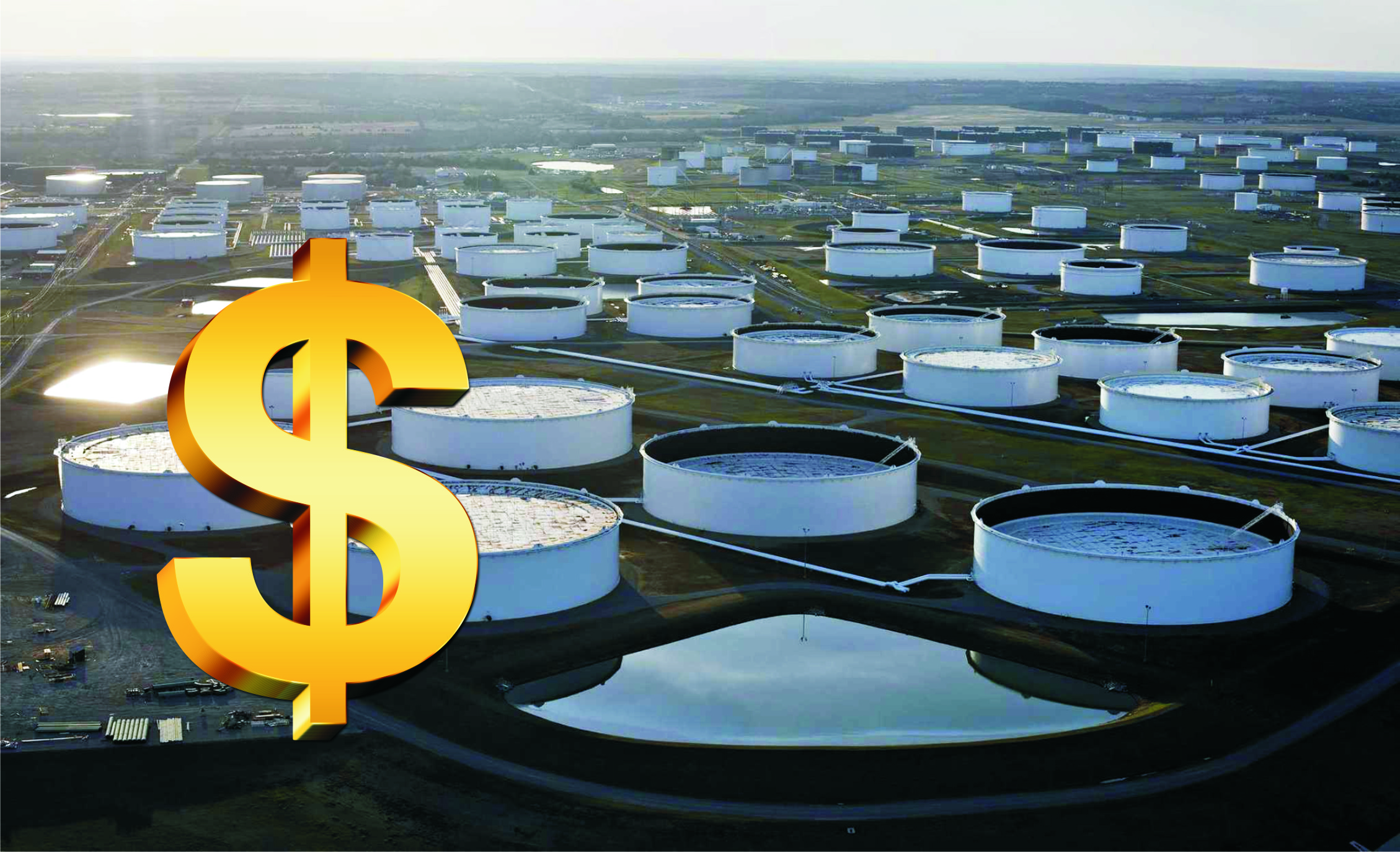Featured
Nigeria Earned $32.6bn From Oil, Gas In 2018 -NEITI

Nigeria Extractive Industries Transparency Initiative (NEITI), yesterday, disclosed that Nigeria earned a total of $32.63 billion from the oil and gas sector in 2018, a 55 per cent increase on the $20.99 billion recorded from the sector in 2017.
In a statement on the release of the 2018 oil and gas industry audit, NEITI also announced plans to release the 2019 audit report this year, effectively clearing the backlogs of the audits of the extractive sector and making the reports more timely and relevant.
Giving a breakdown of the $32.63 billion earned in 2018, NEITI stated that company-level financial flows into government coffers were $16.6 billion, while flows from sales of federation crude oil and gas accounted for $16.billion.
It said, “A five-year trend analysis of the earnings from the extractive sector showed a 54.6% drop from $54.6 billion in 2014 to $24.8 billion in 2015. The earnings further dropped by 31.2% to $17.05billion in 2016, but increased by 23% to $20.99 billion in 2017 and by 55% to $32.63 billion in 2018.
“Though the last two years bucked the trend of persisted decrease since 2014, the revenues from the sector in 2018 were still a staggering 40% below the $54.6 billion earned in 2014 when oil prices commenced a precipitous fall.
“The NEITI 2018 audit reconciled payments by seventy-one companies and the Nigeria Liquefied Natural Gas (NLNG) that met the materiality threshold set for the exercise. A total of eight government entities were also covered by the audit.
“Out of the $32.63 billion earned from the sector in 2018, the sum of $19.92 billion was transferred directly into the Federation Account, while $5.21 billion and $4.04 billion were transferred into the Joint Venture (JV) Cash Call Account and Nigerian National Petroleum Corporation (NNPC) designated accounts respectively.
“The NNPC designated accounts are the Naira and dollar accounts where domestic crude sales and the federation equity, royalty, petroleum profit tax and in-kind oil sales are paid into respectively before remittance to the Federation Account.
The report further disclosed that “$2.10billion was transferred into third parties project financing accounts and $1.37billion were recorded as subnational transfers.”
On production, NEITI stated that the total crude oil production in the country within the period under review was put at 701 million barrels, representing a slight increase of 1.5% when compared to 690 million barrels produced in 2017.
Giving a breakdown of crude oil production, NEITI disclosed that Joint Ventures (JVs) contributed highest production of 315 million barrels, followed by Production Sharing Contracts (PSCs) which recorded 270.610 million barrels.
In addition, it noted that other funding arrangements like Sole Risk (SR), Marginal Fields (MF) and Service Contracts (SC) accounted for 92.2 million barrels, 22 million barrels, and 1.3 million barrels respectively.
NEITI said, “JV companies’ production increased by 3.12% in 2018 compared to 2017, while PSC operators’ production decreased by 10.90%. Similarly, SR operators’ production increased by 58.72% in 2018 compared to 2017. Production from the SC decreased by 10.27% while production from MF operators increased marginally by 1.18%.”
NEITI further disclosed that total crude oil lifted for both export and domestic sales in 2018 was 701 million barrels, representing a 1.9% increase when compared with total liftings of 688.3 million barrels in 2017.
In its analysis of the total lifting in 2018, NEITI stated that 255.6 million barrels or 36% was lifted by NNPC on behalf of the Federation, while companies lifted 445.5 million barrels or 64% of total liftings.
It said, “The liftings by NNPC indicates an increase of 5.95% when compared to 241 million barrels lifted in 2017. Further analysis showed that out of 255.6 million barrels lifted by NNPC in 2018, actual sales were 255.3 million barrels valued at $18.2 billion.
“Out of the 255.6 million barrels lifted on behalf of the Federation by NNPC, a total of 107.63million barrels was recorded as Domestic Crude Allocation (DCA) in 2018. Out of this figure, 94 million barrels or 87% of the DCA were utilized for Direct Sale Direct Purchase (DSDP), while the balance of 13.58 million barrels or 13% was delivered to the refineries.
“Ordinarily, 160.2 million barrels (or 445, 000 barrels per day) should have been allocated for domestic consumption but only 107.63 million barrels or 67% of the customary allocation for domestic consumption was allocated in 2018.
“The sum of N2.295 trillion was realized as proceeds from sales of domestic crude oil allocation in 2018, out of which the following deductions were made: N722.3billion for under – recovery of imported petroleum products, N28.3 billion for crude and product losses and N138.95billion for pipeline repairs and maintenance cost.
“In 2018, total crude oil losses due to theft and sabotage was 53.28million barrels, an increase of 46.15% when compared to 16.824million barrels recorded in 2017”.
Similarly, the report put total products losses in 2018, due to pipeline breakages at 204,397.07 cubic meters.
“On gas production, the NEITI 2018 oil and gas report revealed that the total gas production for the year under review was 2,909,143.69mmscf, while total gas utilization was 2,909,143.55 mmscf.
“From the report, $307.20 million was realized from the sales of Federation gas of 633.55thousand metric tons in 2018. This represents increase of 7.10% when compared to 721.80thousand metric ton valued at $286, 85 million realized in 2017.
“The national gas reserve stood at 200.79tcf as at end of 2018. This is made up of 101.98 tcf of Associated Gas (AG) and 98.81 tcf of Non-Associated Gas (NAG). With the 2018 annual gas production quantity, the gas Reserves Life Index (RLI) was estimated at 92 years”, the report disclosed.”
On management of Joint Venture Cash Call, the report disclosed that aggregate cash call funding for 2018 amounted to $5.98billion.
In addition, the report noted that: “outstanding Cash Call Liabilities amounted to $3.66billion, comprising $3.41billion (93%) legacy liabilities and US$260million (7%) performance balance payable to JV operators”. Another feature of the oil and gas report is on social expenditure.
“Total social expenditure (mandatory and voluntary expenditures) was $902.67million. This consists of voluntary contribution of $59.27million (6.57%) while mandatory contribution stood at $843.39million (93.40%)”.
The mandatory contribution was made up of NDDC’s 3% levy of $683.38million and NCDMB’s 1% levy of $160.01million. Oil and gas industry contribution to the Gross Domestic Product (GDP) in 2018 was put at 7.8%.
“The flows in the industry accounted for $32.64billion in absolute terms. This represents 7.8% of the total GDP Current Basic Price of ($ 418.12billion)”.
Featured
FG To Seize Retirees’ Property Over Unpaid Housing Loans

The Federal Government Staff Housing Loans Board says it has begun the compilation of list of retired civil servants who have defaulted on the full repayment of housing loans obtained.
Head of Information and Public Relations, FGSHLB, Mrs Ngozi Obiechina, disclosed this in a statement in Abuja, yesterday.
Obiechina quoted the Executive Secretary of the Board, Mrs Salamatu Ahmed, as saying that the move was aimed at recovering mortgaged properties from retirees who failed to meet their loan obligations.
Ahmed noted that the decision followed a recent memo issued by Mrs Patience Oyekunle, Permanent Secretary, Career Management Office, Office of the Head of the Civil Service of the Federation.
According to her, the memo reminded public servants of the mandatory requirement to obtain a Certificate of Non-Indebtedness to the FGSHLB and MDA Staff Multipurpose Cooperative Society as a precondition for retirement.
The Executive Secretary said that the board would take necessary legal steps to repossess properties where applicable, in line with the terms of the loan agreements.
She said this was in line with the provisions of the Public Service Rules 021002 (p), issued by the Office of the Head of the Civil Service of the Federation.
“I am directed to bring to your attention the provision of Public Service Rule (PSR) 021002 (p), which mandates all public servants to obtain a Certificate of Non-Indebtedness as a prerequisite for retirement.
“The Federal Government will commence the seizure of mortgaged properties belonging to retiring federal public servants who have failed to fully repay housing loans obtained from the board,” she said.
Ahmed explained that the FGSHLB reserves the legal right to repossess any mortgaged property in cases where a public servant exits service without fully repaying the loan.
She reiterated that the directive also applied to already retired officers who were still indebted.
She urged all affected public servants to regularise their loan status and obtain the required clearance certificate without delay.
“The board is currently compiling a list of such retirees, which will be forwarded to relevant regulatory agencies for debt recovery.
“The FGSHLB remains committed to enforcing compliance and ensuring proper loan recovery procedures are followed, “ she added.
Featured
FG Begins Induction For New Permanent Secretaries, Accountant-General

The Federal Government has kicked off a three-day induction programme for newly appointed Permanent Secretaries and the Accountant-General of the Federation, aimed at equipping them for strategic leadership and effective policy implementation.
The induction, according to a statement yesterday by the Director, Information and Public Relations, Federal Ministry of Information and National Orientation, Eno Olotu, which commenced on Wednesday, is being held at the National Counter Terrorism Centre in Abuja.
Speaking at the opening session, the Head of the Civil Service of the Federation, Mrs. Didi Esther Walson-Jack, congratulated the new appointees and described their roles as pivotal to governance and national development.
“Permanent Secretaries are the engine room of the government. They are critical to driving policy implementation, institutional performance, and reform across the service”, she said.
The Federal Government has kicked off a three-day induction programme for newly appointed Permanent Secretaries and the Accountant-General of the Federation, aimed at equipping them for strategic leadership and effective policy implementation.
The induction, according to a statement yesterday by the Director, Information and Public Relations, Federal Ministry of Information and National Orientation, Eno Olotu, which commenced on Wednesday, is being held at the National Counter Terrorism Centre in Abuja.
Speaking at the opening session, the Head of the Civil Service of the Federation, Mrs. Didi Esther Walson-Jack, congratulated the new appointees and described their roles as pivotal to governance and national development.
“Permanent Secretaries are the engine room of the government. They are critical to driving policy implementation, institutional performance, and reform across the service”, she said.
“The expectations are high, and the responsibility is immense. But with commitment and teamwork, we can deliver a more efficient, accountable, and citizen-centred public service.
“This final lap of FCSSIP 25 calls for urgency, accountability, and strategic focus. You must translate vision into measurable results,” she stated.
In her welcome address, the Permanent Secretary, Career Management Office, Mrs. Fatima Sugra Tabi’a Mahmood, described the programme as a strategic investment in leadership capacity and institutional effectiveness.
The sessions featured expert-led discussions, simulations, and strategic briefings facilitated by a distinguished faculty, including Engr. Suleiman Adamu, former Minister of Water Resources; Dr. Hadiza Bala Usman, Special Adviser to the President on Policy and Coordination; Mrs. Beatrice Jedy-Agba, Solicitor-General of the Federation and Permanent Secretary, Federal Ministry of Justice; Alh. Yusuf Addy, retired Federal Director; Alhaji Bukar Goni Aji, former Head of the Civil Service of the Federation; Amb. Mustapha Lawal Suleiman, Mr. Adesola Olusade, and Dr. Ifeoma Anagbogu, all retired Permanent Secretaries.
Participants include Dr. Obi Emeka Vitalis, Mrs. Fatima Sugra Tabi’a Mahmood, Mr. Danjuma Mohammed Sanusi, Mr. Olusanya Olubunmi, Dr. Keshinro Maryam Ismaila, Dr. Akujobi Chinyere Ijeoma, Dr. Umobong Emanso Okop, Dr. Isokpunwu Christopher Osaruwanmwen, Mrs. Oyekunle N. Patience, Dr. Kalba U. Danjuma, Mr. Nadungu Gagare, Mr. Onwusoro I. Maduka, Dr. Usman Salihu Aminu, Mr. Ogbodo Chinasa Nnam, Mr. Ndiomu Ebiogeh Philip, Dr. Anuma N. Ogbonnaya, Mr. Adeladan Rafiu Olaninre, and Mr. Mukhtar Yawale Muhammed, alongside the Accountant-General of the Federation, Mr. Shamseldeen Babatunde Ogunjimi.
The induction programme will feature sessions on public sector leadership, policy delivery, ethics in service, digital transformation, and performance management.
Featured
NNPCL To Undergo Forensic Audit Soon -FG

The Minister of Finance and Coordinating Minister of the Economy, Wale Edun, has announced that a forensic audit of the Nigerian National Petroleum Company Limited (NNPCL) will begin soon.
Edun revealed this at the ongoing Nigerian Investor Forum, held alongside the IMF/World Bank Spring Meetings in Washington DC.
The minister explained that the recent changes in the NNPCL management are part of a broader effort by the Federal Government to clean up and examine the company closely.
While addressing top global investors, including representatives from J.P. Morgan, Edun shared key reforms the government has introduced to revive the economy and restore investor confidence.
He told the investors that the government’s bold economic steps have laid a strong foundation to attract private investment.
He stated, “Our goal is not just to maintain this momentum, but to accelerate it. We are targeting seven per cent annual growth, and we believe the policies we have implemented have laid the groundwork to achieve this.”
Edun highlighted that President Bola Tinubu’s administration has rolled out major reforms that are already making a difference.
He added that the Nigerian economy grew by 3.84 per cent in the fourth quarter of 2024 and recorded a 3.4 per cent growth for the year.
Edun further stressed the importance of the reforms, describing them as “unprecedented,” adding that, “We said we would do it, and now we have done it. This time, we’re staying the course.”
He pointed out signs of progress such as lower budget deficits, a better trade balance, and a more stable exchange rate.
He also said that the focus is now on growing key sectors, especially agriculture.
According to Edun, agriculture is at the top of the government’s agenda, with the aim of improving food supply and increasing productivity.
“We aim to close the food supply gap, not by importing more, but by enabling domestic producers to scale and innovate,” he said.
On infrastructure, Edun revealed that the government has rolled out 90,000km of fibre optic cable to improve internet access.
He said this move is crucial for supporting young Nigerians and tech startups.
He also noted that 4,000km of roads have been offered for private sector participation, with the first 1,000km already approved for construction.
-
News2 days ago
Over Two Million Candidates Sit For 2025 UTME -JAMB
-
Nation2 days ago
Ekiti Vaccinates Over 226,000 Girls Against HPV
-
Niger Delta2 days ago
Save Journalist Battling Cancer, NUJ Urges Isoko Indigenes
-
Business2 days ago
Keyamo Refutes Claims On Enugu Airport Concession
-
News2 days ago
Nigeria Seeks Return To JP Morgan Bond Index
-
News2 days ago
Okpebholo Denies Paying N6bn To Terrorist Group In Edo
-
Nation2 days ago
Over 26,000 Lagos Students Failed 2024 WASSCE -Commissioner
-
Niger Delta2 days ago
Engage Intellectually On Ijaw Struggle, Dep Gov Urges IYC







